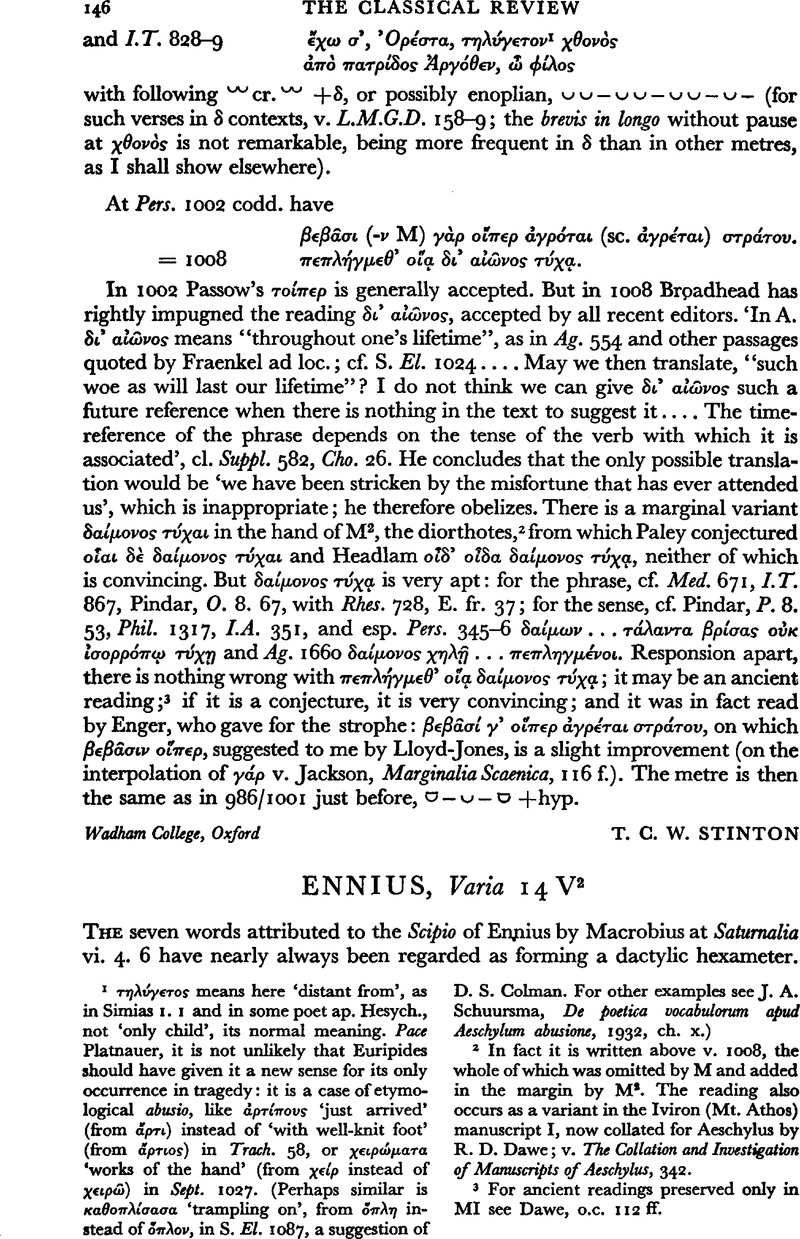No CrossRef data available.
Published online by Cambridge University Press: 27 February 2009

page 146 note 1 τηλ⋯γετος means here ‘distant from’, as in Simias 1. 1 and in some poet ap. Hesych., not ‘only child’, its normal meaning. Pace Platnauer, it is not unlikely that Euripides should have given it a new sense for its only occurrence in tragedy: it is a case of etymological abusio, like αρτ⋯πους ‘just arrived’ (from ἄρτι) instead of ‘with well-knit foot’ (from ⋯ρτις) in Trach. 58, or χειρώματα ‘works of the hand’ (from χε⋯ρ instead of χειρ⋯) in Sept. 1027. (Perhaps similar is καθοπλ⋯σασα ‘trampling on’, from ⋯πλη instead of ⋯πλον, in S. El. 1087, a suggestion D. S. Colman. For other examples see J. A. Schuursma, De poetica vocabulorum apud Aeschylum abusione, 1932, ch. x.)
page 146 note 2 In fact it is written above v. 1008, the whole of which was omitted by M and added in the margin by M2. The reading also occurs as a variant in the Iviron (Mt. Athos) manuscript I, now collated for Aeschylus by R. D. Dawe; v. The Collation and Investigation of Manuscripts of Aeschylus, 342.
page 146 note 3 For ancient readings preserved only in MI see Dawe, o.c. 112 ff.
page 147 note 1 Comicorum Romanorum Fragmenta, ed. 2 (Leipzig, 1873), P. cxvii.
page 147 note 2 ‘In Defence of Ennius’, C.R. lxxvii (1963), 264–5.
page 146 note 3 Compare Sat. vi. 4. 20 with Paulus 59. 26 f. (Lindsay1); vi. 5. 3 with Festus 226. 4. ff. The coincidence of the illustrative examples cannot be accidental. See H. Nettleship, ‘On Some of the Early Criticisms of Virgil's Poetry’ (1881), in Conington and Nettleship, The Works of Virgil, vol. i, ed. 5 (London, 1898), pp. 1–liii.
page 147 note 4 See J. Vahlen, Ennianae poesis reliquiae, ed. 2 (Leipzig, 1903), p. lxvii; L. Rychlewska, ‘De Verriana hexametros afferendi ratione’, Eos xliii (1948/49), fasc. 1, 186 ff.
page 147 note 5 A.P. 263; usually interpreted as a conscious example of the bad composition he is attacking.
page 147 note 6 A.P. 87 and 377; Sat. ii. 3. 134 and 181. This was the only type of caesuraless hexameter composed by Lucretius (seven examples in several thousand verses; see C. Bailey, Prolegomena, p. 112).
page 147 note 7 Cf. Sa. II.
page 147 note 8 Vahlen alleges a number of Ennian examples in Hermes xvii (1882), 603 ff. and Enn. poes. rel., p. 176 (ad Sc. 309), none of which is textually secure. The Plautine examples (see W. M. Lindsay, Early Latin Verse [Oxford, 1922], pp. 101 ff.) cannot all be emended away; but they are not numerous enough to license new creations.
page 148 note 1 e.g. Medea 110–15, Oedipus 233–8; cf. Sophocles Tr. 1010–14; Ph. 839–42; Euripides Hel. 164–5; Tr. 595–602.
page 148 note 2 See, for example, L. Mueller, Quintus Ennius (St. Petersburg, 1884), pp. 107 ff.; J. Vahlen, Enn.poes. rel., p. ccxvi; F. Skutsch, R.-E. v (1905), S.V. Ennius, 2598 f.; F. della Corte, ‘Intorno alle saturae di Ennio’, Atti Ace. d. Torino lxxi (1935/6), t. ii, 198 ff.
page 148 note 3 Cf. Horace Sat. ii. 1. 13 horrentia pilis agmina (parody of epic); Virgil Aen. vii. 526; x. 178; xi. 488; xii. 663.
page 148 note 4 Catullus 64. 112–15 (inde pedem sospes multa cum laude reflexit | errabunda regens tenui uestigia filo, | ne labyrintheis e flexibus egredientem | tecti frustraretur inobseruabUis error) lies behind Aen. v. 588–91 (ut quondam Creta fertur Labyrinthus in alta | parietibus textum coeds iter ancipitemque | mille uiis habuisse dolum, qua signa sequendi | frangeret indeprensus et in remeabilis error). Yet Servius writes FRAN GERET deciperet, falleret: est autem uersus Catuli. See J. Vahlen, Enn. poes. rel., pp. cvi f.
page 148 note 5 Marx's ‘sparsis hastis longis campus’ et horret et alget (fr. 1190) both goes beyond the evidence and misses the point of the criticism which Servius reports.